How Do You Know When You Need New RV Tires?
If you travel often and put a lot of miles on your motorhome tires, you’ll probably want to replace them every 3-4 years. If you travel more infrequently, or have a towable RV (travel trailers or fifth wheels,) you might be able to stretch it out closer to five years, depending on how much travel and assuming your tires are in good condition.
How Old Is Too Old
How old is too old for RV tires? RV tires are expected to last anywhere from five to seven years from the date of manufacture. This date is different from the date that you purchase or install the tires, as sometimes tires may sit in a warehouse for months or even years before they are installed on an RV.
Even if it’s been less than three years since you installed your tires or purchased your new RV, it’s important to check the date of manufacture of your tires because they might be in that five to seven year window of needing to be replaced sooner than you expect.
Do RVs Need Special Tires?
RVs and passenger vehicles are constructed very differently from one another since they serve quite different purposes. While tires on passenger vehicles are constructed with the passenger’s ride in mind, RV tires are designed to carry very heavy loads and therefore have much thicker, stronger sidewalls than standard vehicle tires. Trailer tires are designed for the higher weight rating and load capacity than tires on even most trucks or SUVs.
How to Read Your RV Tires
The information on the sides of your tires tell you a lot about the tires on your trailer. The first part is the letters in front of all the numbers. For RV tires this is probably either LT which stands for Light Truck or ST which stands for Special Trailer.
These are the two most common types of tires that trailers ride on. The first number after these letters tells you the width of the tires in millimeters. The next number after the slash stands for the aspect ratio, or the height of the tire’s sidewall in a percentage of the tire’s width.

The higher this number, the taller or higher the profile of the tire’s sidewall. The next letter that you see stands for the type of construction of the tire. If it is an R, that means the tire is a radial tire. If it’s a D, that means it is diagonal or bias constructed tire.
The next number after this letter stands for the wheel diameter, which is important in determining the right size wheel for the tire to fit snugly into for a safe ride. The final letter that you may see on your tires refers to its weight rating. The higher the letter, the higher the weight rating on the tires with G or H rating being on the higher end of what you might expect to see on a trailer.
Factors to Consider When Buying New Tires
When buying new tires there are a number of things to consider. You must not only decide what type of tire you want to use on your rig, but then you need to know all of the ratings for the tires so you are assured of a safe journey.
Tire Type
When purchasing new tires for your RV there are several variables to consider. First, you’ll want to select the tire type that best suits your trailer and usage.
Special Trailer (ST) Tires
Special Trailer Tires are a type of tire specifically made for trailers. These tires tend to go through a lot more twisting type motions- especially on double axels, so they are built more strongly in the side panels. This makes them the go to option for most towable RV’s. They also have tread patterns specifically designed for trailers stability.
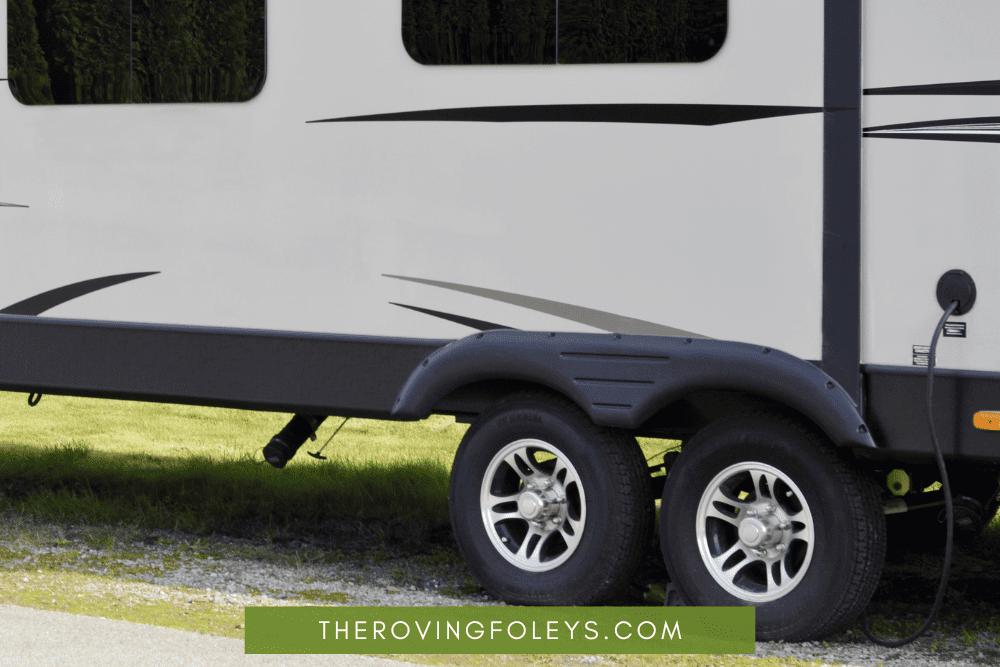
However these tires are not built as heavily in the treads as they do not tend to get as much road mileage as tires on drivable vehicles.
Light Truck (LT) Tires
Light Truck (LT) tires are made for exactly that- light trucks. They have a tread pattern and wall build designed for this purpose. While tread design among truck tires will vary, they are all engineered for this purpose.
Being for use on driving vehicles, these tires tend to have more tread life than trailer tires, so many RV drivers prefer them for their RV’s. However for heavily used RV’s or double axel trailers, this may not be the best idea.
Radial Tires VS Bias Ply Tires
You’ll also want to consider if radial or bias tires are best for your needs. The difference lies in the way the tires belts are constructed and lie inside the walls of the tire. Bias ply belts (typically nylon belts) run at an angle as they circle the tire. Layers criss-cross to create kind of a web effect. This gives strength and stability to the side walls. However the treads do not lie as flat to the road and will tread wear more quickly.
Radial tires steel belts run at a 90 degree angle straight around the tire. This allows the side walls to flex a bit more, giving radials their signature poofy look. The flex allows the treads to sit more flat on the road improving grip and giving a long tread life.
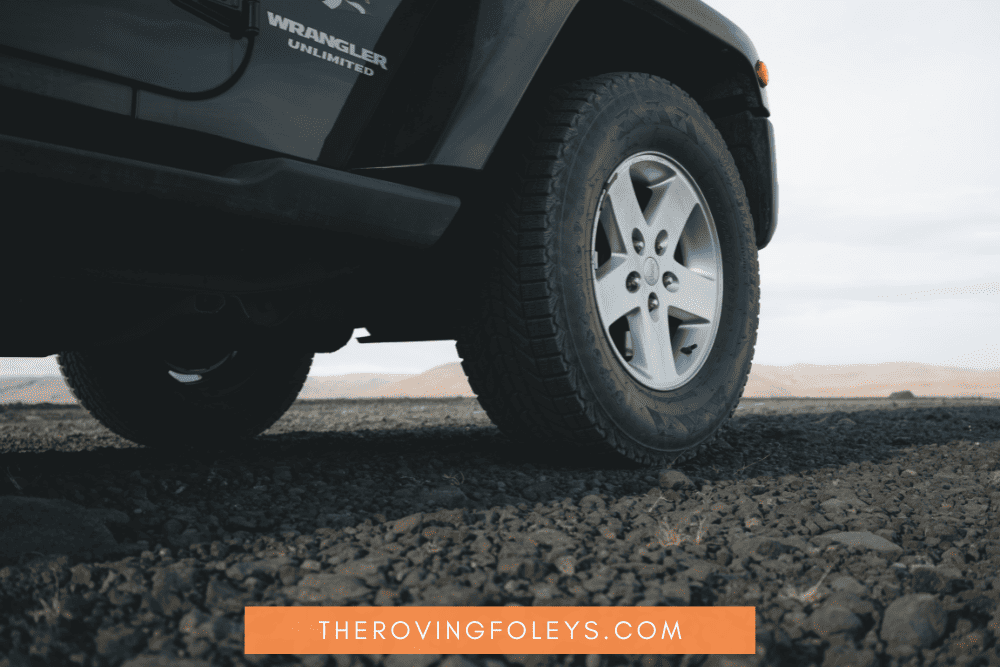
So which is better- depends on use, but generally bias ply tires are designed more for short trips and heavy loads such as work trailers. Radials tend to be better for long haul road trippers, such as fifth wheels.
Air VS Nitrogen
Finally, consider how you will fill your tires. Will you fill them with air or nitrogen? While air is much easier to fill yourself whenever you need to air up your tires, nitrogen is much less likely to leak than air. However, it can be more challenging to find a place to refill nitrogen in your tires if you end up needing that while you are out on the road.
Tire Weight Rating
The tire weight rating is also important to consider. The higher the weight rating, the more sturdy the tire. However, you also have to consider the weight rating for your wheels and axles, and your tire load range or weight rating should not exceed the weight ratings for either of these.
A higher weight rating does not mean that you can add more weight to your trailer because the wheels and axles must also be able to safely carry the weight as well.
Tire Speed Rating
For trailer tires especially, speed rating is very important. Knowing and choosing the right speed rating for your tires may well be the difference between getting there or having a blow-out.
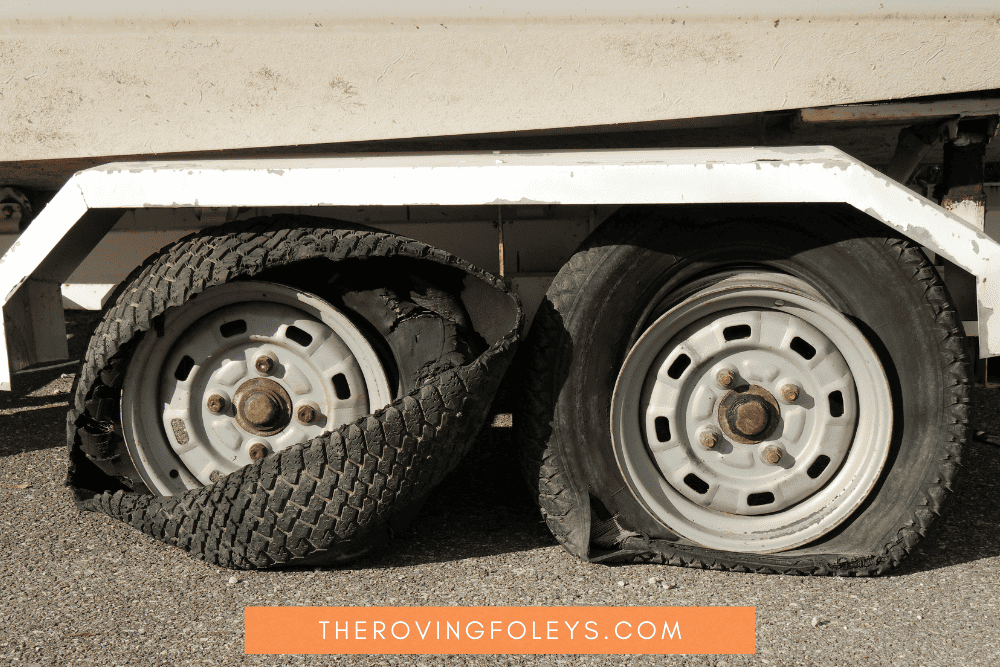
Tire Traction
Tire traction is also important to consider. As you are towing your RV across all types of terrain, you’ll want to make sure that you have the ability to safely drive, maneuver, and stop the trailer in all conditions as well.
Tire Size
Your tire size is equally important. Many common sizes are stocked in local tire shops or major retailers, but some tire sizes will need to be special ordered, meaning you cannot always walk into a shop and purchase the trailer tires that you need to be installed the same day.
Where to Buy RV Tires
You have many options to choose from when deciding where to purchase new tires for your trailer. Buying tires should be a thoughtful and considerate process. Talk to a few sales people before you decide.
RV Rallies:
RV rallies are an excellent option. Many large rallies, such as FMCA or rallies run by a lot of the major RV manufacturers such as Forest River or Grand Design often offer special pricing and even installation of new tires at their rallies. If you will be attending a large RV rally, checking to see if a tire vendor will be on site with tires for sale can save you time and potentially money when replacing your tires.
Truck Tire Dealers:

Truck tire dealers are another popular option for sourcing replacement tires for your trailer. They typically carry more of the LT and ST tire sizes and types or are able to order the tires you need in from their suppliers within a matter of days.
Large Retailers:
Large retailers are another option to consider. In addition to tire dealers like Discount Tire, retailers like Walmart and Sam’s Club, Costco or even Camping World also typically carry many of the tire sizes and styles that RV owners are looking for to replace their worn or old trailer tires.
Online
You can also shop online retailers such as Amazon for the tire purchase you need and have them shipped to you. Once they arrive you will need to take the tires into a tire shop to have them mounted and installed on your trailer, but sometimes you can find a deal ordering your tires online and then just paying a local tire shop for the installation.
Popular RV Tire Brands
You’ll hear a lot of opinions on what tire brands are the best for trailers and RVs. Many will claim that the tires that come standard on new RVs are inferior and should be replaced right away. While they might not be the best tires in their class, they should be rated for the size and weight of your RV when fully loaded to manufacturer specifications.
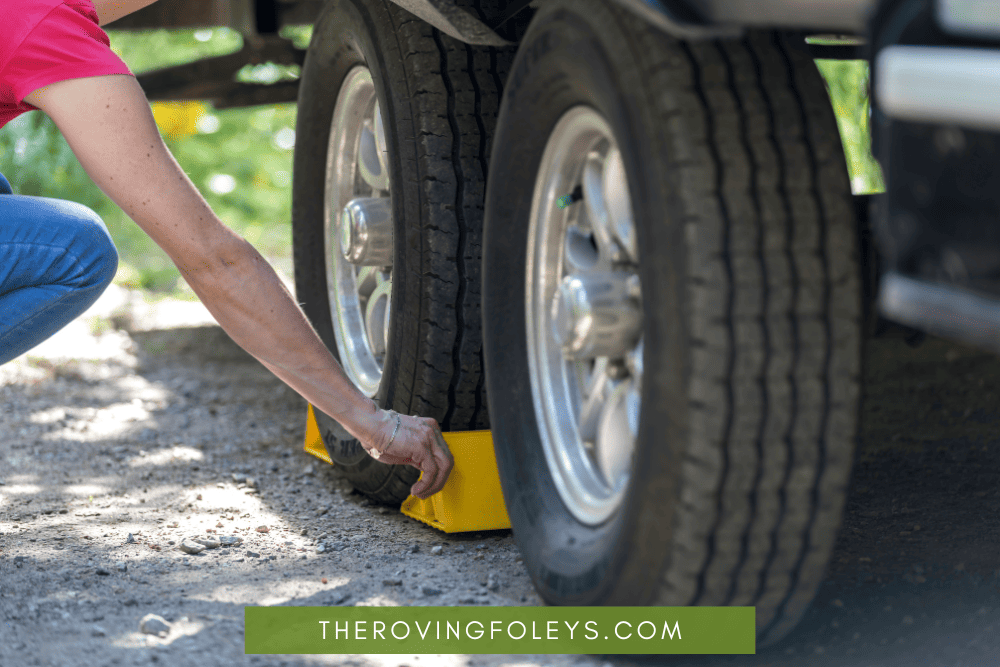
If you are looking for a name brand to replace your trailer tires with, Maxxis, Sailun, and Goodyear RV tires are some of the highest rated and most frequently recommended tires for trailers by RV owners. These tires are rated to carry heavy loads and are built with quality construction.
Top Light Truck (LT) Tires
When choosing light truck tires, Michelin and Goodyear tires come out on top in recommendations for trailers as well as motorhomes. Look for steel belted radial tires with high weight ratings that will provide sold durability and dependability for your money.
Top Special Trailer (ST) Tires
When shopping for special trailer tires, 10 to 14-ply radial tires are a solid bet with brands like Maxxis and Sailun being highly recommended. Goodyear RV tires are also a solid choice for ST tires, depending on the size and weight rating of your tires. If you have a triple-axle trailer, the tire’s sidewalls will take more of the pressure when turning than in comparable double-axle trailers, so the sturdier sidewalls of ST tires are going to be much more important to look for in outfitting your triple axle trailer with a new set of tires.
RV Tire Prices
The cost of replacing RV tires can vary greatly. For smaller trailers with lower weight ratings, you might be able to replace each tire for around $100 per tire plus installation, especially if you are not as particular on the brand that you are purchasing. When pricing larger, higher weight rated tires or a premium brand you could easily be looking at $300 or more per tire plus installation.

While price alone should not be the only factor to consider when shopping for tires, the broad range of pricing can certainly make quite a different in the options available within your budget. For most trailer sizes and weight ratings, you are likely to find a good option for your trailer that suits your needs for around $200 per tire plus the cost to install them, which varies from $10-50 or more per tire, depending upon the tire shop you choose.
Setting Your RV Tire Pressure
Perhaps the most important factor in preserving your tires’ longevity is setting the tire pressure appropriately. Having correct tire pressure will also improve rolling resistance which is the amount of energy required to keep them moving. Always keep a good RV Tire Pressure Gauge in your glove box so you can check often.
Softer tires require more energy to move, so provide less fuel efficiency. Over-inflated tires will not sit properly on the road causing undue wear and early replacement of the tires. Having a properly inflated tire increases fuel economy and maximized tire life.
While tires are rated for the weight of the RV and the speed that you’ll tow it at, it’s important to account for all factors at work in setting optimal tire pressure for your RV.
Accounting for Altitude & Temperature
Accounting for altitude and temperature is exceedingly important. When you are traveling from a higher elevation to a lower elevation, the pressure in your tires will decrease as your elevation decreases. While minor fluctuations are normal and safe to allow to occur, if more than a few pounds of pressure changes with your elevation decrease, and if you will continue traveling at a lower elevation, then topping off your tires with air at a rest stop is wise to keep your tires at a steady air pressure.
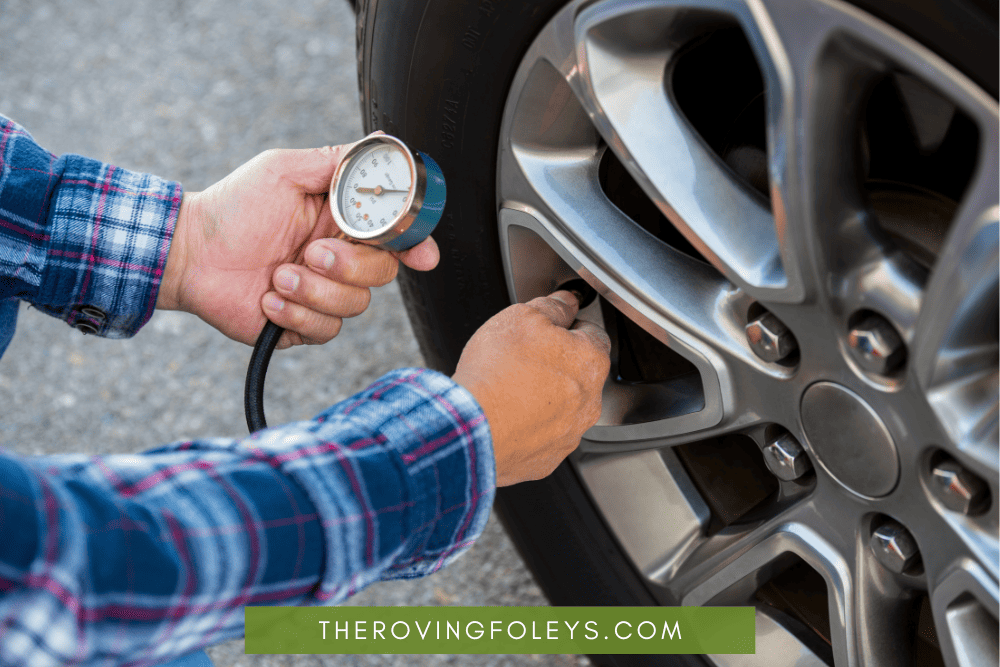
Similarly, when traveling from somewhere with a high air temperature to a significantly lower air temperature, the pressure in your tires will decrease as the temperature changes. While some minor fluctuations are normal and your tires can absorb those changes, if you find that the change is more than a few pounds of pressure difference, adding some air to your tires to account for the change will help keep your rolling at optimal tire pressure.
Weight Matters
Another important aspect to consider is the weight of your RV. The weight that is rolling on your tires matters considerably. Within reason, you’ll adjust the air pressure of your tires to account for whether you are towing an empty trailer or if it’s fully loaded.
When your trailer is fully loaded to its manufacturer specs for maximums cargo capacity, your tires should also be aired up to their full capacity in order to distribute the weight of your rig appropriately across the full tread of the tires. When towing an empty trailer the tires do not need to be aired to their highest PSI rating, but can be set a bit lower and you can still safely tow your trailer. It is important to consult the manufacturer specs for your tires to always ensure that you are airing them within the minimum and maximum range for your RV and the load that you are carrying.
Related Articles
- Hiking Zion National Park
- Hiking Bryce National Park
- RV Length For EVERY National Park Campground
- Best RV Destinations For This Year
Tire Pressure Monitoring System (TPMS)
An important addition to your RV set-up as an RV owner that is invaluable for safely towing your trailer is a tire pressure monitoring system or TPMS. The purpose of a TPMS is to continuously monitor the tire pressure and temperature as you are traveling down the road. You can set the minimum acceptable limits as well as the maximum limits for your tire’s specs into the TPMS.
The system will alert you should a tire’s pressure or temperature fall outside the acceptable limits. An example of this is should a tire get punctured while driving down the highway and a slow leak occurs, causing the pressure in a tire to drop below the acceptable minimum that you input, a sensor will alarm you to stop so that you can investigate the problem and change the tire.

Another example of how this can be helpful is if the temperature sensor on one of the tires raises significantly and goes outside of the acceptable range, you can be alerted to pull over and check that tire which might have a defect or other mechanical issue that could be caught before a catastrophic failure occurs.
Many brands and options are available on the market for tire pressure monitoring systems. It’s a small investment that could save you a lot of time, money and headache in tires that could be saved with advance notice of an issue while towing.
Replacement Cost
While the cost of replacing your RV’s tires is something to budget for, it doesn’t have to break the bank. Many tire stores and retailers offer discounts for purchasing a full set of tires or for having them installed at their store. For most trailers, you can replace all 4 or 6 tires for under $1000 unless you choose a premium brand or style of tire.
When you consider the cost of the investment in the purchase of your trailer or the high price to repair cosmetic or even structural damage that can often be avoided by replacing tires before they are too old or too worn for safe travel, it’s an investment worth creating space in the budget for. Having the right tires for your RV will help to insure safe travels and happy camping for you and your family for years to come.

Frank Foley
Frank is the Head Hubby, Daddy, and Fix-It Guy of the Roving Foleys clan. He ia an avid traveler and has spent over 5 years traveling full time with his family. he loves helping others learn about the RV life. He has also traveled in Europe, Asia, and Australia with his wife Grainne.

